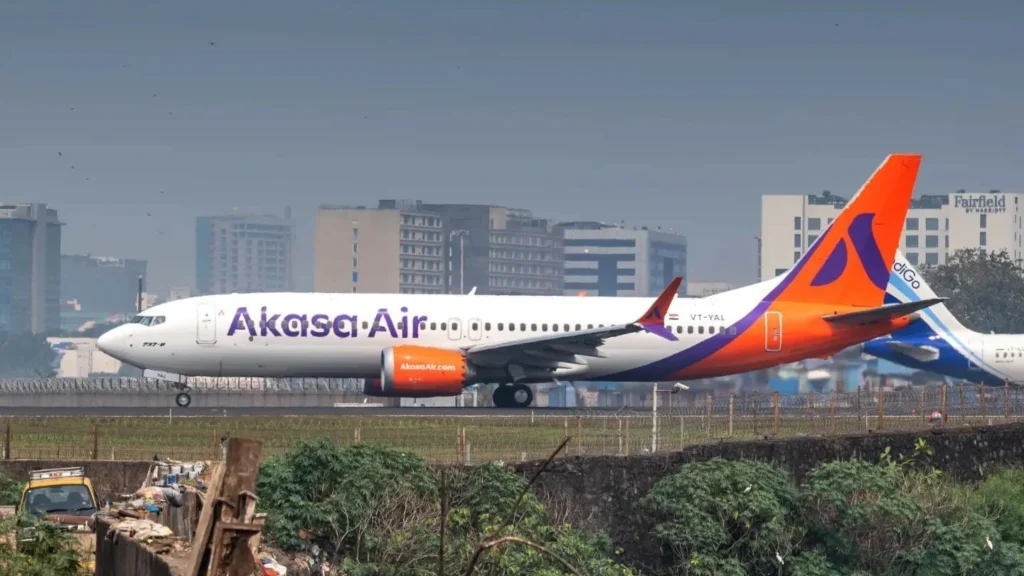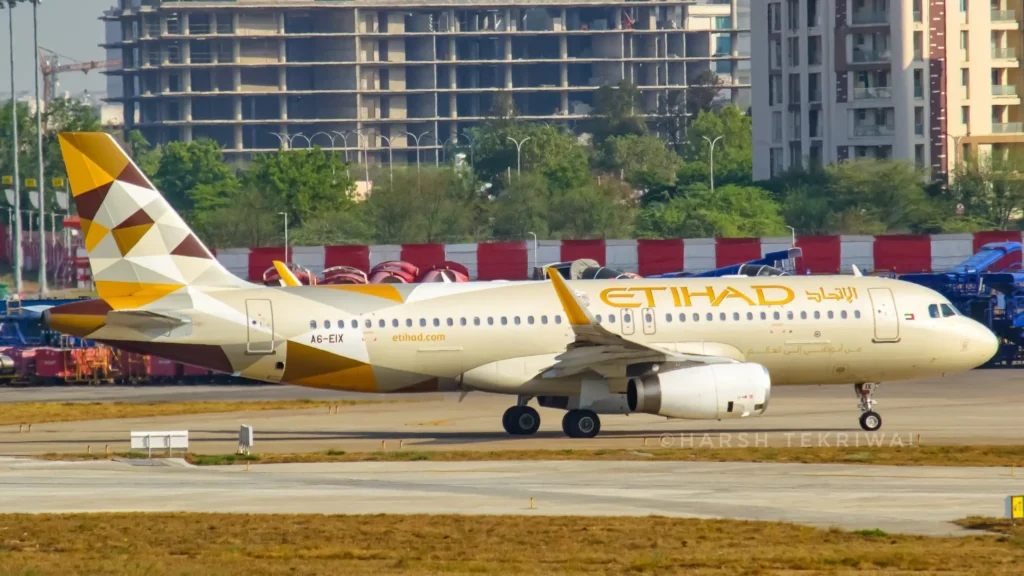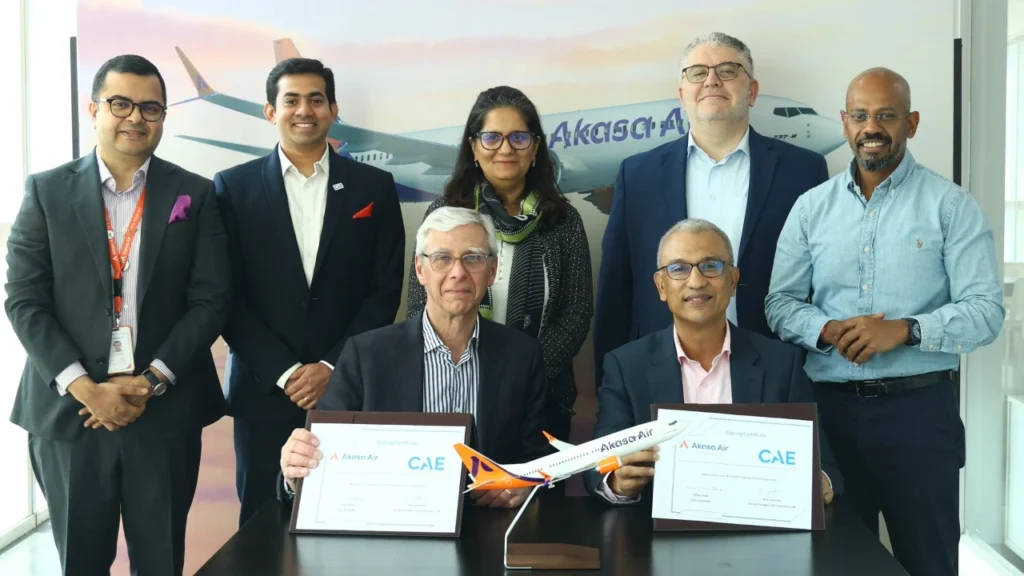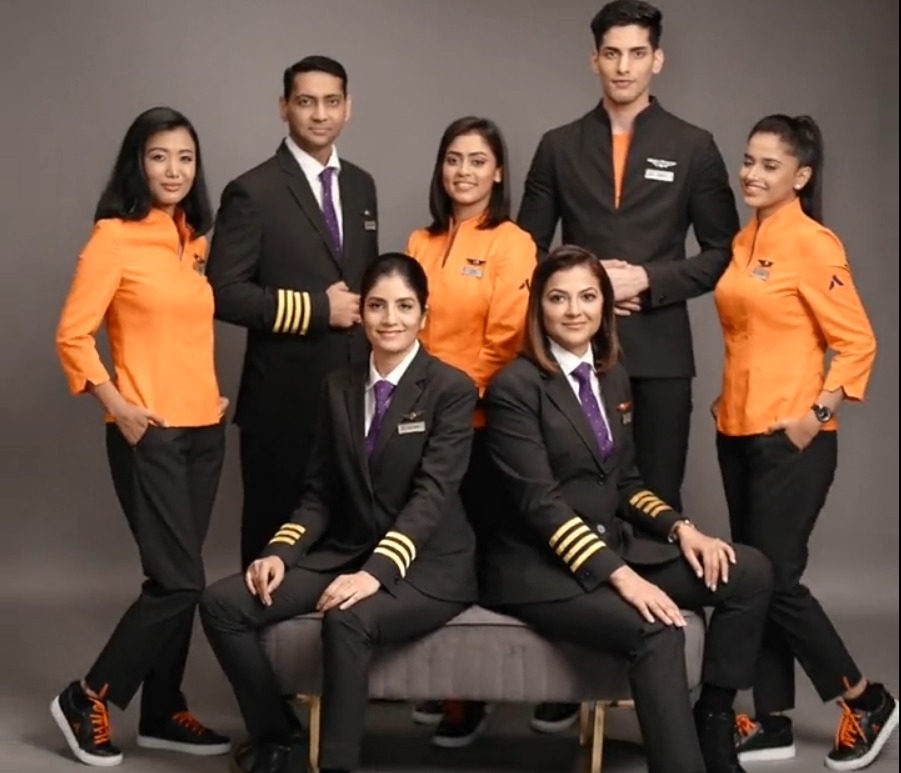Akasa surprised everyone in early December when it announced a Codeshare arrangement with Etihad (EY).
MUMBAI- You may not have made your New Year’s plans yet, but someone is preparing for 2025! Akasa Air (QP) has announced a Christmas Special menu and recently signed a Codeshare deal with Etihad Airways. New investors have also joined the company. This comes after it joined with CAE in Canada for pilot training.
Indian Airlines contributes significantly to the development of the aviation industry.IndiGo (6E) and Air India (AI) are forming a market duopoly, while SpiceJet (SG) and Akasa Air aim to profit on the growing demand.

Akasa Air Founders and Foundation
Akasa is the seventh Indian airline to feature a metal bird in the sky. The airline began commercial operations on August 7, 2022, with an inaugural flight from Mumbai to Ahmedabad, following the delivery of its first Boeing 737 MAX 8.
Vinay Dube, the airline’s CEO, anticipated that the fleet will number approximately 72 aircraft within five years. The airline now operates 26 aircraft and has placed an order for an additional 200, all Boeing 737 MAX fleet.
As of October 2024, Akasa Air flies to 25 destinations, including 20 domestic and 5 international.
In an interview with The Economic Times, Akasa Air’s CEO, Vinay Dube, warned that the competition is becoming more intense.
“…(the competition) does not worry us because we continue to be India’s fastest growing airline, we continue to have the most competitive cost structure, we built this into our base, we have an incredibly solid financial foundation, and with that as a base, if we can keep our customers happy as we are, talked about our on-time performance, our baggage delivery, I have not begun to touch upon the feedback we are receiving, the way I describe the feedback we are receiving
Profitable by 2028?
Revenue increased by more than fourfold to Rs 3,069.58 crore from Rs 698.67 crore in FY23. Ankur Goel, the airline’s CFO, stated that the fleet capacity will increase by 50-55% in FY25, increasing revenue by roughly 50%. Total expenses more than tripled last fiscal year, reaching Rs4,814.4 crore from Rs1,522 crore in FY23.
Goel noted that the corporation invested heavily in fleet expansion, brand promotion, and new hiring, particularly pilots, which boosted prices!
Employee benefit expenses rose to Rs 774.9 crore in FY24 from Rs 232.4 crore the previous year, as the airline hired 1,400 additional employees, bringing its total workforce to 3,800!
When challenged about the losses, Ankur Goel told ET that it takes several years for an airline to stabilize and break even.
Despite this, Akasa co-founder and CEO Vinay Dube believes the company will be profitable within the next three years, according to an interview with The Economic Times published in August 2024. The airline will go public in 2028!
New Investors for Akasa
Akasa grew faster than any other new Indian airline in its first two years.
Its mounting losses, which are not uncommon for young airlines, demand further funding as it strives to grow large enough to enter the Indian aviation sector’s two-horse battle between IndiGo and Air India, which account for more than 90% of the market.
Akasa has already eclipsed its much older rival SpiceJet, which has been experiencing financial troubles. SpiceJet flew 3.35 lakh passengers in October, while Akasa transported 6.16 lakh passengers, accounting for 2.4% and 5.4% of total domestic passenger traffic, respectively, according to DGCA data.
Two well-known individuals are betting millions of dollars on Akasa Air. According to ET, Premji Invest and Claypond Capital, the family offices of Wipro founder Azim Premji and Manipal group head Ranjan Pai, are acquiring a sizable minority stake in Akasa Air each. The transaction is part of the budget carrier’s $130-140 million fundraising efforts.
“The foundational years of any airline are dedicated to investing in its people, fleet, training, operating infrastructure, and network, and hence no airline registers P&L profits in these years.”
According to an industry observer, delays in aircraft deliveries might have a greater impact on a startup airline like Akasa than established airlines. In response, Goel stated that the airline is currently “comfortably positioned”.
According to ET, the Premji Invest-Claypond funds group has provided the carrier with new capital for future expansion and aircraft pre-delivery payments.

Akasa’s Codeshare with Etihad
Akasa surprised everyone in early December when it announced a Codeshare arrangement with Etihad (EY). While neither airline issued a formal statement, Akasa Air flights with Etihad codeshare started appearing on Etihad’s booking engine.
This will be Akasa Air’s first and only codeshare, with operations beginning in August 2022.
Flights to Abu Dhabi from Ahmedabad and Bengaluru begin in March 2025 and can be booked on the Gulf carrier’s website using the code “Operated by Akasa Air” and an Etihad flight number. Akasa Air also offers those flights on its website. This gives Akasa Air a unique advantage over other companies.
IndiGo, for example, had its first codeshare in 2019, after starting operations in 2006.
Throughout its 18-year history, Go FIRST has not offered a single such promotion. SpiceJet no longer has a codeshare arrangement with Emirates, despite a highly reported announcement that never occurred.
With the agreement, Akasa Air will be able to deploy additional capacity to Abu Dhabi, allowing it to expand its international presence, enhance utilization, and secure rights in locations that are still easily accessible compared to other destinations.

Partnership with CAE & Pilot Hiring
Akasa Air and Canadian aerospace giant CAE signed a 15-year agreement in March 2024 to enhance their presence in the Indian aviation sector. The arrangement calls for CAE to provide Boeing 737 Max training to Akasa Air pilots at sophisticated facilities in India.
Akasa Air will use CAE’s training facilities, trainers, and cutting-edge full-flight simulators for an extended length of time. This move underscores CAE’s commitment to Akasa Air’s continued growth and the highest standard of pilot training.
In a tragic episode in September of last year, Akasa Air was forced to cancel around 24 daily flights after approximately 43 pilots abruptly resigned to join competitor carriers without completing their mandatory notice periods.
The airline was so worried that it declared in front of the Delhi High Court that it was in a “state of crisis” and that it “may shut down”. However, the airline later announced that it has no intention of shutting down.
Vinay Dube mentioned-
“We’ve stopped employing pilots. We have enough pilots for our existing fleet. We have a lot of pilots for our progress. We are focusing on improving their abilities.”

Akasa Air Pilots Salary
To compete and attract skilled pilots, a pilot’s salary is likely to be competitive as well.
Currently, the salary structure of Pilots are as follows–
| Akasa’s Flight Deck Crew– Salary Structure w.e.f. 01 July 2023 | |||||
| Hours | Transition Capt./Capt. | Sr Transition Capt./Sr Capt. | FO | Sr FO | Trainee Capt. |
| Monthly FIxed Salary (40 Hrs) | 550000 | 625000 | 260000 | 340000 | 430000 |
| Hourly pay post 40 Hrs | 7500 | 7500 | 3045 | 4515 | 5000 |
| Projected Sal @55 Hrs | 662500 | 737500 | 305675 | 407725 | 505000 |
| Projected Sal @60 Hrs | 700000 | 775000 | 320900 | 430300 | 530000 |
| Projected Sal @70 Hrs | 775000 | 850000 | 351350 | 475450 | 580000 |
| Hourly pay post 70 Hrs | 10000 | 11000 | 3045 | 4515 | 5000 |
| Projected Sal @80 Hrs | 875000 | 960000 | 381350 | 520600 | 630000 |
We’ll produce a separate post with an updated wage in the following weeks, so stay tuned. Until then, see the salaries of pilots in India here:
Redefining Travel with Industry First Offerings
Akasa Air has a daring new vision of what it means to fly in the modern day, with initiatives ranging from gourmet in-flight meals to pet-friendly travel, all driven by a commitment to diversity and customer satisfaction.
Cafe Akasa, Pets on Board, SkyBeats, SkyLights, SkyScores & more!
Akasa Air is spreading holiday cheer in the skies with the debut of its third annual Christmas special supper from Café Akasa, the airline’s onboard dining service.
Café Akasa’s dynamic menu is constantly updated to meet a variety of culinary preferences, with over 45 meal options available, including fusion cuisine, regional appetizers, and delectable desserts.
In keeping with its commitment to inclusive travel, Akasa Air allows pets on board, whether in the cabin or in the cargo section.
Akasa Air has introduced SkyBeats by Akasa, which offers a unique musical experience throughout aircraft boarding and deplaning. The airline’s performances, created by local Indian musicians, are tailored to different times of day – morning, afternoon, and evening – and combine contemporary sounds with Indian undertones.
Akasa Air developed SkyLights by Akasa, which enhances the customer experience by creatively employing the lighting features of the Boeing Sky Interior.
Furthermore, Akasa Air’s SkyScore by Akasa program provides live updates on match scores from major sporting events throughout the year on its flights.
QuietFlights provides quiet late-night and early-morning flights. For flights between 22:00 and 06:00 hrs, Akasa Air has reduced announcements to vital safety messages and modified cabin lighting to create a peaceful ambiance, allowing passengers to enjoy uninterrupted leisure and privacy.
Tail Note
To summarize, Akasa Air’s path in the Indian aviation sector is similar to assembling IKEA furniture—it’s ambitious and presents some problems, but when done correctly, it’s durable and here to stay. With its modern aircraft, reasonable pricing, and a clear focus on passenger experience, the airline has quickly gained traction in a saturated market.
Akasa appears to be preparing to rise even higher, hopefully with less turbulence and more munchies, as it seeks domestic and worldwide expansion. If it maintains its trend, Akasa Air might become the go-to option for travelers searching for a nice flight at 35,000 feet!












Leave a Reply